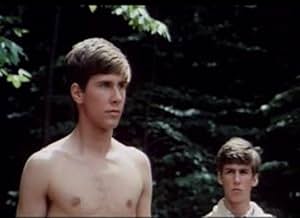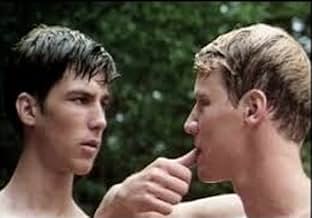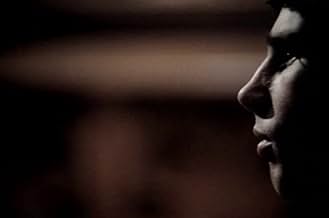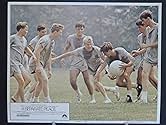Two roomates at a prep school in New England during World War II come to grips with the war, jealousy and betrayal. Based on a novel by John Knowles.Two roomates at a prep school in New England during World War II come to grips with the war, jealousy and betrayal. Based on a novel by John Knowles.Two roomates at a prep school in New England during World War II come to grips with the war, jealousy and betrayal. Based on a novel by John Knowles.
Falko Schilling
- Student
- (uncredited)
Steve Walker
- Student
- (uncredited)
- Director
- Writers
- All cast & crew
- Production, box office & more at IMDbPro
Featured reviews
As with many film adaptations, fans of the book can't but feel that they've been slightly cheated by the movie. The 1972 adaptation's faithfulness to the book can be commended, but it comes at a heavy price. The movie is so faithful that it was filmed at the boarding school, "Phillips Exeter Academy," that John Knowles attended and drew inspiration for the book from. The movie goes as far as to fill the cast, with the exception of Gene, with students and alumni who participated in the Academy's drama club. The actors' lack of experience shines throughout the movie and viewers are left with the notion to laugh. Lines, taken from the book, are delivered blandly and lack any emotion.
On positive thing that the movie brings to the table is the setting, being filmed at the boarding school where the book was "set" everything seems right. When they introduce the tree, you can't help but wonder if the novel's story is closer to non-fiction rather than fiction.
The movie makes an attempt to convey the symbolism found in the book, but without Gene's constant narration a viewer who hasn't read the book would find it very hard to grasp.
Although the movie makes an earnest attempt at greatness, the inexperienced cast, and low budget get in the way to frequently.
On positive thing that the movie brings to the table is the setting, being filmed at the boarding school where the book was "set" everything seems right. When they introduce the tree, you can't help but wonder if the novel's story is closer to non-fiction rather than fiction.
The movie makes an attempt to convey the symbolism found in the book, but without Gene's constant narration a viewer who hasn't read the book would find it very hard to grasp.
Although the movie makes an earnest attempt at greatness, the inexperienced cast, and low budget get in the way to frequently.
The many negative comments on this elegant tale of the rites of adolescent angst insisted I watch again to see what they are talking about. These are teenagers so their actions aren't obliged to make sense. The pregnant pauses and alleged poor acting is awkward emotional teenage behavior mildly obscured because they're bright, articulate kids with lots of rivalries - but there is more going on here.
No one has even mentioned the emotional range of the very powerful snow-shoveling scene euphoria to unutterable sadness, screaming to silence: terrified kids. While the war is symbolic for the emotional swings of the children throughout the film it is very much less important as an influence.
Thematically what no reviewer seems to see here is the love story which foments the jealous, insecure, blind, ignorant savage underneath', illogical urge to strike out. When you don't know what else to do somebody's going to get hurt: these are scared, hormonal, vulnerable, lonely, forty's boys and coming out just isn't done.
Worse still - it may be unrequited love - even though it's just you and me buddy', and I'm good for you' and the beach is where you don't just come with anybody' and Finny's got himself and Gene undressed down to their underwear every chance he gets. Confusion reigns supreme afterward in the dorm when Gene - hasn't been the same since the beach' - and he's worried about something' unrevealed. And again later when he's wearing Finny's clothes and then again when he's stuttering on the phone.
Consider the reaction devastation when Finny thinks Gene might enlist and the ode to friendship that is the Winter Carnival where Gene wins all the gold - after training for the Olympics'. These boys are experiencing feelings which are strong and bubbling over all the time and they have no experience to cope with them.
The confession deals marvelously with the ethical problem of the selfish, sociopathic moment the stupid impulse the temporary insanity, when everything was changed forever, but in tears stops just short of Gene telling Finny he loves him. Then again in the hospital - a confession and forgiveness, but no relief from what the lad cannot express: there is no unraveling, no spilling his guts and no moment of truth.
Years later, all the fear and anger returned' - there is no peace, ever.
No one has even mentioned the emotional range of the very powerful snow-shoveling scene euphoria to unutterable sadness, screaming to silence: terrified kids. While the war is symbolic for the emotional swings of the children throughout the film it is very much less important as an influence.
Thematically what no reviewer seems to see here is the love story which foments the jealous, insecure, blind, ignorant savage underneath', illogical urge to strike out. When you don't know what else to do somebody's going to get hurt: these are scared, hormonal, vulnerable, lonely, forty's boys and coming out just isn't done.
Worse still - it may be unrequited love - even though it's just you and me buddy', and I'm good for you' and the beach is where you don't just come with anybody' and Finny's got himself and Gene undressed down to their underwear every chance he gets. Confusion reigns supreme afterward in the dorm when Gene - hasn't been the same since the beach' - and he's worried about something' unrevealed. And again later when he's wearing Finny's clothes and then again when he's stuttering on the phone.
Consider the reaction devastation when Finny thinks Gene might enlist and the ode to friendship that is the Winter Carnival where Gene wins all the gold - after training for the Olympics'. These boys are experiencing feelings which are strong and bubbling over all the time and they have no experience to cope with them.
The confession deals marvelously with the ethical problem of the selfish, sociopathic moment the stupid impulse the temporary insanity, when everything was changed forever, but in tears stops just short of Gene telling Finny he loves him. Then again in the hospital - a confession and forgiveness, but no relief from what the lad cannot express: there is no unraveling, no spilling his guts and no moment of truth.
Years later, all the fear and anger returned' - there is no peace, ever.
I had to read this book for English and it was one of the few books I actually liked. Then we watched the movie and it was horrible. I have never seen a movie degrade a book as much as this did. The characters hardly said anything and it left out too many parts. When Leper was supposed to be skiing, when Gene was on the way to help clear the railroads, he was drawing. The acting was awful and there was no character development. They need to remake this film with characters who could act it out a little better. And then someone needs to make it so it actually follows the book.
The 1972 film version of John Knowles modern masterpiece is a class act for the reason that Paramount Pictures went to Phillips Exeter Academy and filmed it on location with all student actors from Exeter with the exception of Parker Stevenson whom attended The Brooks School. Though the acting is a little amateurish,so what,it should be, for it is the drama society of the school and alumni putting on a Paramount Film!
John Heyl,a former Exeter Student, was eighteen and son of the school's doctor. John Heyl does a great job as Finny at the age sixteen,seventeen that Finny would have been in the novel. This was also Parker Stevenson, at eighteen, his first film and in my view his best role as Gene.
It is a good adaptation of the book but I would strongly suggest that you read the novel first for the tensions of love, hate,jealously, denial, sexual undertone, and regret are pale compared to John Knowles' writing.
It is a love story with war looming closer to the boys of The Devon Academy. The viewer decides if this love is emotional and / or physical. What else could motivate ones "Best Pal" and roommate to do such a violent act as to attempt to maim him hence excorise him (Finny) from Genes life i.e. emotions so deep that Gene could not deal with at sixteen.
I have recently viewed Showtime's 2004 version which was filmed at a college in Canada and has actors that are in there late twenties playing the parts of teenagers. No sorry - Veto! John Heyl will always be Finny and Parker Stevenson will always be Gene. The 1972 film version shot at Exeter is the true "Preppy Classic".
John Heyl,a former Exeter Student, was eighteen and son of the school's doctor. John Heyl does a great job as Finny at the age sixteen,seventeen that Finny would have been in the novel. This was also Parker Stevenson, at eighteen, his first film and in my view his best role as Gene.
It is a good adaptation of the book but I would strongly suggest that you read the novel first for the tensions of love, hate,jealously, denial, sexual undertone, and regret are pale compared to John Knowles' writing.
It is a love story with war looming closer to the boys of The Devon Academy. The viewer decides if this love is emotional and / or physical. What else could motivate ones "Best Pal" and roommate to do such a violent act as to attempt to maim him hence excorise him (Finny) from Genes life i.e. emotions so deep that Gene could not deal with at sixteen.
I have recently viewed Showtime's 2004 version which was filmed at a college in Canada and has actors that are in there late twenties playing the parts of teenagers. No sorry - Veto! John Heyl will always be Finny and Parker Stevenson will always be Gene. The 1972 film version shot at Exeter is the true "Preppy Classic".
Many years after graduating college in New Hampshire in 1942, a nostalgic man revisits the campus of his alma mater in the off-season and reminisces about his roommate, a gregarious and reckless lad who goaded his friends into living for the day, breaking the rules and--most especially--jumping out of a tall tree into the lake below. Overlooked film version of John Knowles' semi-autobiographical novel (which, in turn, was expanded from his short story "Phineas") has a deeply personal feel even on the screen. While Knowles denied any homoerotic undercurrents in the text, those who do sense an attraction between the roommates, played here by John Heyl and Parker Stevenson, are bound to be the film's biggest admirers (when the novel is discussed in schools, it is said that homosexuality is never brought up in class, yet that hasn't stopped some schools from banning the book). There's a lovely simplicity--and, conversely, an unspoken complexity--in the friendship between the young men, which screenwriter Fred Segal cautiously, carefully tiptoes through (which is better than being tiptoed around). Director Larry Peerce works well with his actors, most of them non-professionals, and shows a keen, stylish eye for the period (surprising, since Peerce at this point had not shown much sensitivity). Not a hit with audiences, the picture grossed just under $1M at the US box office and was promptly forgotten, but it has a special sort of gleam. **1/2 from ****
Did you know
- TriviaThe scene where the boys all suddenly start singing "Hitler has only got one ball" was unscripted. Director Larry Peerce continued filming to see how it played out, with the scene ending up in the final cut.
- How long is A Separate Peace?Powered by Alexa
Details
Box office
- Gross US & Canada
- $921,268
- Runtime
- 1h 44m(104 min)
- Sound mix
Contribute to this page
Suggest an edit or add missing content






















